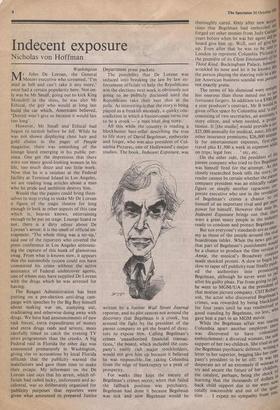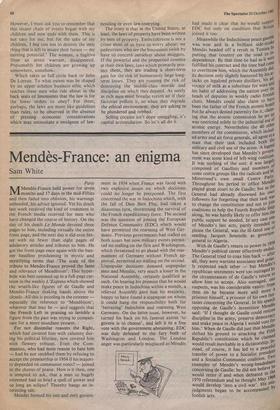Indecent exposure
Nicholas von Hoffman
Washington
Mr John De Lorean, the General Motors executive who screamed, 'I'm mad as hell and can't take it any more,' once had a certain popularity here. Not on- ly was he Mr Small, going out to kick King Monolith in the shins, he was also Mr Ethical, the guy who would at long last build the car which, Americans believed, 'Detroit won't give us because it would last too long'.
However, Mr Small and Ethical had begun to tarnish before he fell. While he was not shown displaying chest hair and gold chains in the pages of People magazine, there was something of the lounge lizard emerging in his public per- sona. One got the impression that there were too many good-looking women in his life, too much disco and too little work. Now that he is a resident at the Federal facility at Terminal Island in Los Angeles, we are reading long articles about a man who let pride and ambition destroy him.
Would that the papers could bring them- selves to stop trying to make Mr De Lorean a figure of the tragic theatre for long enough to look at other aspects of this case which is, heaven knows, entertaining enough to be put on stage. Lounge lizard or not, there is a dirty odour about De Lorean's arrest: it is the smell of official en- trapment. 'The whole thing was a set-up,' said one of the reporters who covered the press conference in Los Angeles announc- ing the capture of this hunk of glamorous swag. From what is known now, it appears that the automobile tycoon could not have committed his crime without the active assistance of Federal undercover agents, one of whom may have supplied De Lorean with the drugs which he was arrested for having.
The Reagan Administration has been putting on a pre-election anti-drug cam- paign with speeches by the Big Boy himself about making war on, stamping out, eradicating and otherwise doing away with drugs. We have had announcements of new task forces, extra expenditures of money and extra drugs raids and arrests, more carefully timed to catch the evening TV news programmes than the crooks. A big Federal raid in Florida the other day was announced prematurely in Washington, giving rise to accusations by local Florida officials that the publicity warned the malefactors and gave them time to make their escape. My informant on the De Lorean case says that his arrest, which of- ficials had called lucky, unforeseen and ac- cidental, was so deliberately organised for publicity purposes that reporters were given what amounted to prepared Justice Department press packets.
The possibility that De Lorean was seduced into breaking the law by law en- forcement officials to help the Republicans win the elections next week is obviously not going to be publicly discussed until the Republicans take their best shot at the polls. As interesting is that the story is being played as a freakish anomaly, a quirky con- tradiction in which a businessman turns out to be a crook — a man bites dog story.
All this while the country is reading a blockbuster best-seller describing the true to life story of David Begelman, embezzler and forger, who was also president of Col- umbia Pictures, one of Hollywood's major studios. The book, Indecent Exposure, was written by a former Wall Street Journal reporter, and its plot centres not around the discovery that Begelman is a crook, but around the fight by the president of the parent company to get the board of direc., tors to expose him. Calling Begelman's crimes 'unauthorised financial transac- tions,' the board, which included the com- pany's vastly rich major stockholders, would not give him up because it believed he was responsible for taking Columbia from the edge of bankruptcy to a peak of prosperity.
For weeks they kept the nature of Begelman's crimes secret; when that failed the fallback position was psychiatry. Begelman had done it because Begelman was sick and now Begelman would be
The Spectator 30 October1981 thoroughly cured. Only after new accusa; tions that Begelman had embezzled allu, forged yet other monies from Judy Galan' years before when he was her agent did the board give him up. Well, sort of give hini up. Even after that he was to be sent 1° London to represent Columbia Pictures at the premiere of its Close Encounters of the Third Kind. Buckingham Palace, however,' wrinkled its nose and let it be known that the person playing the starring role in atria jor American business scandal was persona not exactly grata. The terms of his dismissal were notahlY less onerous than those meted out to less tt fortunate forgers. In addition to a $300,nv:, a year producer's contract, Mr B would given office space by Columbia and 'a stall consisting of two secretaries, an assistant, a story editor, and when needed, a Prnjec.. tionist. It [the studio] would provide a ea,; $25,000 annually for medical, auto, life an other insurance premiums; $26,000 OW: ly for entertainment expenses, first-class travel plus $1,500 a week in expenses while on trips; legal fees ...' etc, etc. On the other side, the president of the parent company who tried to fire Begehrn, was himself fired for the attempt. As tnle' closely researched book tells the story, th reader cannot be certain whether the parent company president was an ethically valiant figure or simply another rapacious cot: porate executive who saw in the revelatin", of Begelman's crimes a chance to fit; himself of an important rival and get nint. power for himself. However that may be' u' Indecent Exposure brings out that ther,) were a great many people in the 'n • luso ready to condone and protect Begelnlart,,r, But not everyone's standards are as 511'.., my as those of the people around the oval boardroom tables. When the news got Old that part of Begelman's punishment wow,- be a chance to produce the film version 0's Annie, the musical's Broadway creatort made shocked protest. A slow to begin blin, slow to taper off publicity roar finallYPn! ed the authorities into prosecul Begelman, although he never went to jai after his guilty pleas. Far from going to jai ; he went to MGM/UA as the president n' that motion picture company. Cliff Roberts son, the actor who discovered Begelnland crimes, was rewarded by being blacklists for four years until he was readmitted ,.too good standing by Begelman, no less, wn gave him a part in an MGM movie. While the Begelman affair was tearing_ Columbia apart another employee there, was discovered to have coinmatea embezzlement: a divorced woman, the sole support of her two children. She tried to use the Begelman psychiatric defence, writing '1 letter to her superior, begging like her come pany's president to be let off: 'It was t desperate act of an extremely ill woman 1' try and secure the future of her children; the catalyst, perhaps, being the shock O` learning that the thousands of dollars in back child support due to me were n° totally inaccessible and out of the clnes-
tion I expect no sympathy from you However, I must ask you to remember that this insane chain of events began with my children and now ends with them. This is not easy for me, but for the sake of my children, I beg you not to destroy the only thing that is left to insure their future — my earning potential.' The woman, a fugitive from an arrest warrant, disappeared. Presumably her children are growing up somewhere, somehow.
Which takes us full circle back to John De Lorean. To what extent was he shaped by an upper echelon business ethic which teaches these men who ride about in the back seats of limousines that the law is for the lower orders to obey? For them, perhaps, the laws are more like guidelines than rules, to be observed in the absence of pressing economic considerations which may necessitate a smidgeon of law- bending or even law-snapping.
The irony is that in the United States, at least, the laws of property have been written by men of property. Embezzlement is not a crime most of us have to worry about: we pedestrians who see the limousines swish by have to concern ourselves about muggers. If the powerful and the propertied connive at their own laws, laws which primarily pro- tect them, they are trading a short-term gain for the risk of humorously large long- term losses. They are running the risk of destroying the middle-class morale and discipline on which they depend. As surely as rich men must breathe rotten air if their factories pollute it, so when they degrade the ethical environment, they are asking to be plundered and robbed.
Selling cocaine isn't dope smuggling, it's capital accumulation. So let's all do it.











































 Previous page
Previous page